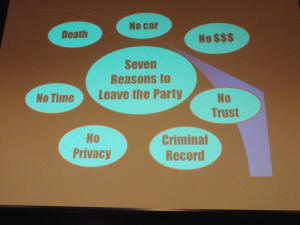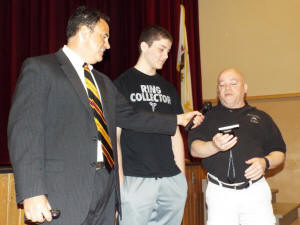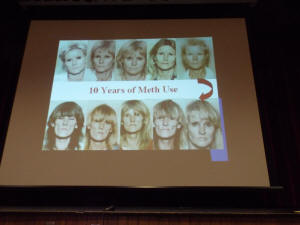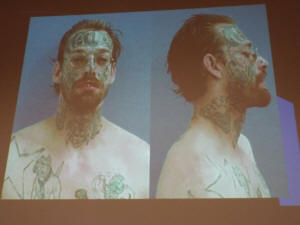|
 The program called "7 reasons to leave the party" was sponsored
by the Illinois Judges Association, the Healthy Communities
Partnership Alcohol, Tobacco, and Other Destructive Behaviors
Program and the high school. The program called "7 reasons to leave the party" was sponsored
by the Illinois Judges Association, the Healthy Communities
Partnership Alcohol, Tobacco, and Other Destructive Behaviors
Program and the high school.
With prom and graduation just around the corner in local high
schools, Kostigan wanted to drive home the consequences of bad
behavior. Those consequences can include jail time, permanent
criminal records, loss of driving privileges, as well as permanent
damage to future college and career goals.

Speaking candidly and bluntly, Kostigan walked through the seven
reasons including death, criminal records, no trust, no time, no
privacy, no money, and no car.
Obviously no one wants to see that first reason, death, occur. But
the fact is in the age bracket between 15 and 20 years, one-third of
all deaths are due to motor vehicle accidents, and of those deaths,
36-percent are alcohol related.

Kostigan told a story of a young man who had been given a hot new
car for his birthday. One night while drinking with friends, they
decided to take the car out and see how well it should “corner.” He
took a curve at a high rate of speed, hit loose gravel, and wrecked.
One passenger was ejected from the car and instantly killed when
hitting the pavement. Another passenger, the car landed on her
crushing one leg. After surgery and repairs to the leg, it is now
shorter than the other, and she is physically damaged for life due
to this incident. The young man driving was uninjured, but still
suffered the legal consequences of his actions.
Kostigan said a criminal record is something that will follow a
young person throughout their lives, and that if kids believe they
will be treated as juveniles for alcohol and drug offenses, they are
wrong.
If stopped with drugs or alcohol in a car, they can be charged with
driving under the influence, consumption, possession, transportation
of alcohol and more. They can be fined up to $2,500, placed under
court-ordered supervision, have their license suspended, be subject
to random testing, forced to undergo drug treatment, and can even be
forced to forfeit their cars to authorities.
Kostigan also spoke about the strange things that happen when under
the influence. He talked about a young man at a party who needed a
bathroom, but the facility was busy. Tired of waiting, he went
outside and urinated in a parking lot. The act was witnessed by a
patrolling police officer. The young man was charged with indecent
exposure.
Years later, this same young man, now a stellar student with a
bright future applied to the FBI. He was confident that he was
qualified, but the FBI rejected him. He contacted them and found out
it was his criminal record that had hurt his future. He argued that
he was a kid; it was a long time ago, and that he was very well
qualified for the FBI. The answer came back, “There are hundreds who
are qualified that DON’T have criminal records.”

Kostigan said once arrested, trust goes out the window. From that
time on good parents will want to know where you are going, who
you’ll be with, when you will be home, and more.
And, he said, forget about your right to privacy; it is gone. He
said once you have a record, and if you are on probation, a police
or probation officer has the right to administer a breathalyzer test
at any point in time.


Kostigan introduced McLean County Probation Officer Mike Donovan,
who drafted a volunteer from the audience to take a portable “blow
test.” Kostigan said the test could be administered at any time at
the officer’s discretion to those convicted of alcohol-related
crimes.
He also talked about the fact that if arrested and taken to a police
station, a urine test may be required. An officer will accompany the
person to the bathroom and watch him, or her urinate. He said that
some repeat offenders come up with creative ways to fool the police,
but it never works.
He also told a story of a woman, a suspected drug dealer, who had
been sold pot and cocaine in a sting operation. The police allowed
her to leave the purchasing scene then arrested her. They could not
find the cocaine. As a result, Kostigan was called on to issue a
search warrant for the human body. He said it was a strange request,
and he questioned the circumstances. He was told that the cocaine
was not to be found but that the female suspect was indicating
through her behavior that something was going on in her crotch area.
He issued the warrant. The female was taken to a hospital for a
cavity search, and the cocaine was found “up there.” Kostigan ended
this commentary telling the students that if they consider buying
drugs, they should remember this story because ultimately, they have
no idea where those drugs have been.

Kostigan also spoke about the financial cost of getting caught.
Throughout the morning, he showed slides in a PowerPoint
presentation that indicated what the minimum and maximum fines would
be when found guilty of an offense. The least of these was $500. He
talked about teenagers having part time jobs and told them to stop
and consider, do they really want to spend their paychecks on paying
fines?
In another portion of the program Kostigan set the stage for a party
going on un-chaperoned. In the kitchen, there were kids and booze,
in the bedroom there were kids with pot, in the basement there were
kids having sex, and on the back porch a fight was going on.

When the police raid the party, there are going to be a lot of
arrests. He said in the kitchen kids are found sitting at a table
with a can of unopened beer sitting there. He asked who would be
charged with possession of alcohol; and told the students that
everyone at the table would be charged because the beer does not
have to be in anyone’s hand in order for it to be considered in
possession, it only has to be in the room basically.
[to top of second column] |


He talked about what was going on in the basement. He said if the
two having sex include an 18-year-old, and a 15-year-old, charges
will be brought against the 18-year-old for criminal sexual abuse.
That charge will also force that 18 year-old to register as a Sex
Offender, a tag that will follow him for many years to come. In
addition, there would be to up to one year in jail and a fine of up
to $2,500. Kostigan also pointed out that there is no discrimination
in this law. If the 18-year-old is a female and the male is the
younger person, that female will suffer the same consequences.
Kostigan also talked about the residual charges that will follow the
raid of a party. The legal aged relative who purchased the alcohol
will be charged for his or her actions. The parents, even though
they were not at home and didn’t know the party was going on, will
also be charged.

Kostigan began wrapping up his presentation by talking to the kids
about how drugs change their looks over time. He showed slides of
attractive people who became aged and ugly because of the use of
drugs.


He also talked about the affect of “beer goggles,” showing slides of
people who are ordinary, if not unattractive. As alcohol is consumed
that ordinary person becomes more attractive in the eyes of the
drunk.

On another slide, Kostigan showed handwriting samples of a simple
sentence written sober, after two drinks, four drinks, five drinks,
and seven drinks. Noting the deterioration of the penmanship, he
read the bottom line of the slide, “When you drink too much, you
can’t handle a car. You can’t even handle a pen.”

Kostigan said people also do stupid things when they are drunk or
high. Showing a slide of a local convicted drug user. Michael C.
Knuth, better known as " Tattoo" was arrested in 2009 after firing
on a Lincoln Police Officer, and is currently in prison. He said
that when Tattoo would get high, his favorite thing to do was add a
new tattoo, preferably on his face.

Kostigan also spoke about a parent contract that he would like for
every kid and parent to sign. In the contract, the young person
promises that if he or she finds himself in an undesirable or
dangerous situation, he or she will call mom and dad to come and get
them out.
Mom and dad are going to agree that when they get that call, they
will come. But they are also going to promise that they will do so
discreetly and won’t embarrass their son or daughter by making a
scene in front of their child’s peers. They are also going to agree
not to lash out at their child. For the parents, it should be a no
questions asked policy.
For mom and dad, this is not going to be an easy task. Using himself
as an example, he said he had two children, and someday he may get
that call. He said he would go, but he would be upset and angry, he
knew that. But, he would hold his tongue and drive his child home in
silence. In the morning, when he was calmer, he would remember the
courage it took for his child to make that call. He said for a kid
to buck his or her friends, and make the right decision takes a lot
of courage, and parents need to remember that the morning after.
[Download
and print a copy of the contract here]
Kostigan ended his presentation with a very disturbing and graphic
slideshow. The subject was a young woman with a promising future
ahead of her. She was hit by a drunk driver. Her car caught fire,
and she was literally burned alive inside it. She was severely
mutilated as a result, but did survive. The slideshow shows her
suffering and how she lives today. The last slide is a poster used
publicly to help discourage drunk driving. The words at the top of
the poster read; “Not everyone who gets hit by a drunk driver dies.”
[The
sideshow may be viewed by clicking here.
Be warned, these images are graphically disturbing.]
After the presentation, Lincoln Police Officer Tim Butterfield
said that the local department is always on the alert for parties
and there is a heightened awareness at this time of year. He said,
“We stay alert because we want to see these young people safe, we
want them to graduate and lead productive lives.”
The staff of LDN share this sentiment. This is a great time of year
for Logan County youth, and we hope and pray that it will be a fun,
rewarding, and safe time for all.
[Nila Smith]
 |